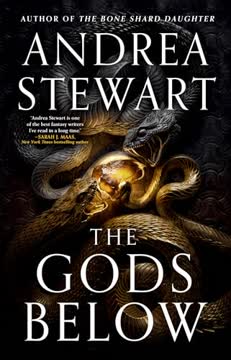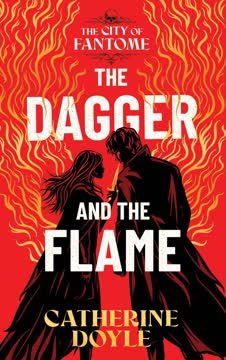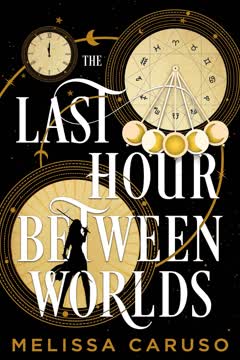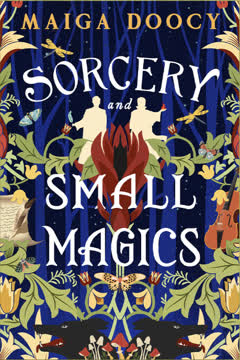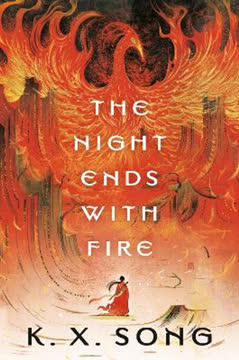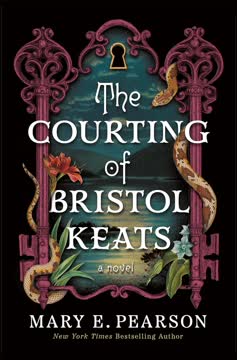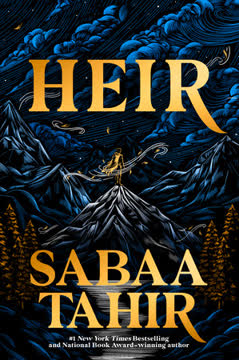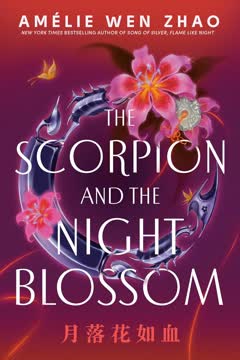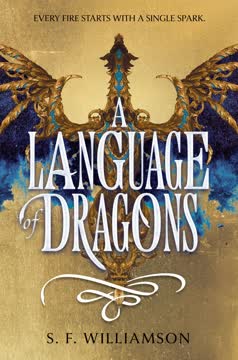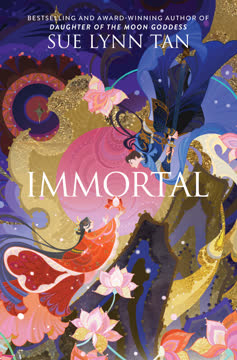Plot Summary
Shattered World's Remnants
The world is a scarred remnant of its former self, shattered by mortals who burned the magical Numinars to fuel their machines. The gods, once powerful and aloof, retreated to the earth's depths, refusing to mend the damage. Only Kluehnn, a many-limbed god, offered a bargain: he would restore the world, but at a terrible cost. Restoration comes realm by realm, remaking the land and its people, demanding half of each population as raw material. In this harsh new world, survival is a daily struggle, and the old ways are dying. The story opens on Hakara, a resourceful teenager, diving for abalone to feed her younger sister, Rasha, both orphaned and clinging to each other in the ruins of Kashan.
Sisters on the Run
When the black wall of restoration approaches their settlement, Hakara and Rasha are forced to flee, leaving behind the only home they've known. The restoration is both a miracle and a terror: it promises lushness and plenty, but at the cost of lives and identity. The sisters, desperate and barefoot, try to cross the border into Langzu, but are denied passage due to poverty and forged papers. In the chaos, Hakara bargains her way into a group of miners, hoping to save Rasha, but is betrayed and separated from her. Rasha is caught by the restoration, altered into something monstrous and alone, while Hakara is dragged into Langzu, her fate uncertain, her promise to protect her sister broken.
Restoration's Black Wall
Rasha survives restoration, but is changed—her body now horned and clawed, her childhood lost. Alone in a strange, lush world, she waits for Hakara, clinging to hope. She is eventually taken in by Millani, a priestess of Kluehnn, and becomes part of the den, a place of worship and training for the altered. Rasha's longing for her sister is a wound that never heals, shaping her into someone both fierce and vulnerable. Meanwhile, Hakara, wracked with guilt and loss, is forced into the brutal life of a sinkhole miner in Langzu, her only goal to one day find and rescue Rasha.
Altered and Alone
A decade passes. Hakara becomes a hardened miner, risking her life daily in the toxic aether of the sinkholes, always saving for a way back to Kashan. She is marked by trauma and driven by the need to atone for losing Rasha. Rasha, now a young woman, rises through the ranks of Kluehnn's den, training to become a godkiller—one of the elite altered who hunt the old gods. Both sisters are shaped by their loneliness and the violence of their worlds, each believing the other lost or changed beyond recognition.
Sinkholes and Survival
Hakara's desperation leads her to risk everything for a rare god gem, diving past the forbidden second aerocline. She survives the toxic aether and swallows the gem, awakening strange powers—her arms grow strong and monstrous, echoing the gods themselves. This act draws the attention of the Unanointed, a secretive group resisting Kluehnn's rule. They see Hakara as a potential linchpin in their plan to break the god's hold on the world. Hakara, still focused on finding Rasha, is swept into their schemes, forced to confront the cost of survival and the lure of power.
The Price of Escape
The Unanointed reveal their plan: to steal and infuse three legendary corestones with concentrated aether, breaking Kluehnn's cycle of restoration and freeing Langzu from his grip. Hakara, uniquely able to survive the second aerocline and infuse the stones, becomes essential to their cause. She bargains for news of Rasha, agreeing to help in exchange for a chance to find her sister. The Unanointed are a fractured, desperate group, each haunted by loss. Hakara bonds with Thassir, a brooding, winged altered with secrets of his own, and together they prepare for a heist that could change the fate of the world.
Ten Years of Loss
In the den, Rasha endures brutal trials designed to weed out the weak and forge killers loyal only to Kluehnn. She forms fragile alliances with other acolytes, but the system is built on betrayal and violence. The final test is to kill a god, a task that forces Rasha to question everything she's been taught. Her longing for Hakara is both a strength and a vulnerability, and as she rises in the ranks, she must decide what kind of person she will become: a tool of the god who remade her, or something more.
The Unanointed's Bargain
As the Unanointed's plans accelerate, Hakara is forced to bond with Thassir, whose true nature is revealed—he is not merely altered, but the son of two elder gods, hiding in plain sight. Their partnership is fraught with mistrust, attraction, and the shared burden of loss. The heist on the Otangu clan's orchard is a bloody success, but at great cost. The Unanointed are decimated, and Hakara is left questioning the morality of their cause and her own role in the cycle of violence. The lines between friend and foe, mortal and god, blur as the stakes rise.
Schemes in the Deep
The Unanointed's leader, Mitoran, is unmasked as Lithuas, an elder god and master of deception. She has manipulated both mortals and gods, using the resistance to further Kluehnn's aims. The final corestone is hidden deep within a den, and Hakara, now the only one capable of infusing it, is forced into a deadly confrontation. Betrayed by those she trusted, Hakara swallows the corestone to keep it from falling into Kluehnn's hands, risking her life and sanity in the process.
The Sovereign's Game
In Langzu, Sheuan Sim, a brilliant and ambitious woman from a fallen clan, navigates the treacherous world of politics and power. She discovers the secret of Mullayne's filters, which can protect mortals from the aether and possibly from restoration itself. Sheuan bargains with the Sovereign, trading the filters for her family's redemption and a place at his side. Her choices will shape the fate of Langzu, but at the cost of her own heart and the possibility of a different life with Rasha, whom she loves and leaves behind.
Trials of the Godkillers
Rasha and her allies face the last trial: to hunt and kill a god. The task is both a rite of passage and a moral crucible, forcing Rasha to confront the lies of Kluehnn's faith and the true nature of the gods. She questions the cycle of violence and the cost of obedience, even as she proves herself a survivor. The lines between victim and perpetrator, faith and doubt, blur as Rasha claims her place among the godkillers, forever changed by what she has done and what she has lost.
Reunion and Betrayal
Amid the chaos of the den's assault, Hakara and Rasha finally meet. The reunion is fraught with longing, guilt, and recrimination. Rasha, now a godkiller, rejects Hakara's offer of rescue, choosing her new identity and home over the past. The sisters are on opposite sides of a war they did not choose, each shaped by years of separation and suffering. Their bond, once unbreakable, is now a wound that will never fully heal.
The Corestone Heist
The Unanointed's assault on the den is a desperate gambit. Hakara, mortally wounded and infused with the corestone's power, becomes the linchpin of the plan. Thassir, revealed as the son of gods, unleashes his full strength to protect her. Lithuas's betrayal is exposed, and the true nature of Kluehnn's restoration is revealed: it is the corestones, not the god gems, that fuel the cycle. In a climactic battle, Hakara and Thassir face gods and godkillers alike, risking everything to break the cycle of violence and give Langzu a chance at a different future.
Gods Among Mortals
Interwoven throughout the narrative are glimpses of the elder gods' past: Nioanen, Irael, Lithuas, and others, their loves and losses, their failures and betrayals. The gods are not distant or infallible, but flawed beings, haunted by regret and the consequences of their choices. Their stories echo in the lives of mortals, shaping the world in ways both subtle and profound. The line between god and mortal is thinner than anyone realizes, and the true enemy may not be Kluehnn alone, but the cycle of power and sacrifice that binds them all.
The Den's Bloody Reckoning
The den is left in ruins, its ranks decimated, its faith shaken. Rasha, now a godkiller, must live with the choices she has made and the blood on her hands. Hakara, changed by the corestone and her bond with Thassir, becomes a reluctant leader to the survivors of the Unanointed. The world is not healed, but the possibility of change remains. The sisters' paths have diverged, but their stories are forever entwined, each carrying the scars of what they have lost and what they have chosen to become.
The Third Aerocline
Mullayne and his dwindling crew descend into the earth, discovering a third, deadlier aerocline and the truth behind Tolemne's legend. The journey is a test of endurance and faith, claiming the lives of friends and leaving Mullayne alone with the knowledge that the stories were wrong: Tolemne returned to the surface, changed by what he found. The secrets of the gods and the nature of restoration are more complex and tragic than anyone on the surface realizes.
The End of Hope
In the aftermath, Hakara and Thassir confront the limits of forgiveness and the burden of survival. Rasha, triumphant and broken, faces a future shaped by violence and doubt. Sheuan, having chosen power over love, becomes the Sovereign's right hand, her heart divided between duty and desire. The world remains scarred, but the cycle of restoration is broken—at least for now. The story ends with the survivors choosing what remains: hope, memory, and the possibility of something new.
Characters
Hakara
Hakara is the story's beating heart—a fierce, stubborn survivor shaped by loss and guilt. Orphaned young, she becomes both mother and sister to Rasha, promising to protect her at all costs. When restoration tears them apart, Hakara's life becomes a quest for redemption, marked by dangerous bargains and self-sacrifice. She is resourceful, quick-witted, and unafraid to challenge authority, but her greatest flaw is her inability to forgive herself. Over ten years, she hardens into a miner and fighter, yet her love for Rasha remains her driving force. Hakara's journey is one of painful growth: learning to accept her limits, to let go, and to find purpose beyond her own wounds. Her relationships—with Rasha, Thassir, and the Unanointed—reveal her capacity for loyalty, love, and, ultimately, leadership.
Rasha
Rasha is Hakara's younger sister, transformed by restoration into something both monstrous and beautiful. Her childhood is stolen, replaced by the brutal training of Kluehnn's den. Rasha is sensitive, intelligent, and deeply lonely, her longing for Hakara shaping her every choice. As she rises through the ranks to become a godkiller, she is forced to confront the violence and betrayal at the heart of her new family. Rasha's arc is one of self-discovery and moral reckoning: she must decide whether to be a tool of Kluehnn or to forge her own path. Her relationship with Hakara is both a source of strength and a wound that never heals, and her brief, passionate connection with Sheuan reveals her capacity for love and vulnerability.
Thassir
Thassir is a winged altered who is, in truth, the son of two elder gods, Nioanen and Irael. Haunted by loss and centuries of survival, he hides his true nature, tending to stray cats and avoiding involvement in mortal affairs. Thassir is brooding, fiercely loyal, and deeply wounded, carrying the trauma of his family's murder and the burden of immortality. His bond with Hakara awakens feelings he has long suppressed—desire, hope, and the willingness to fight again. Thassir's arc is one of reluctant heroism: he is drawn back into the world's struggles, risking everything for Hakara and, through her, for the mortals he once abandoned.
Sheuan Sim
Sheuan is a brilliant woman from a fallen Langzuan clan, trained to be both weapon and diplomat. She is fiercely intelligent, adaptable, and skilled at reading and influencing others. Her loyalty to her family drives her to make dangerous bargains, trading the secret of the filters for power and redemption. Sheuan's relationship with Rasha is a rare moment of vulnerability and genuine connection, but her ambition ultimately leads her to choose duty over love. She is a mirror to Hakara: both are shaped by obligation and loss, both must decide what they are willing to sacrifice for a future they may never see.
Mitoran / Lithuas
Mitoran, the leader of the Unanointed, is revealed to be Lithuas, an elder god and master of change and deception. She manipulates mortals and gods alike, using the resistance to further Kluehnn's aims and her own survival. Lithuas is cold, calculating, and deeply pragmatic, believing that sacrifice is necessary for progress. Her betrayal is a turning point, exposing the futility of resistance built on lies. Lithuas embodies the dangers of unchecked power and the moral ambiguity at the heart of the world's cycle of violence.
Millani
Millani is a red-scaled priestess of Kluehnn, responsible for training and hardening the den's acolytes. She is both nurturing and cruel, believing that suffering is necessary for strength. Millani's relationship with Rasha is complex—part mother, part rival, part adversary. She embodies the seductive power of faith and the dangers of institutions that demand loyalty at the expense of compassion.
Dashu
Dashu is a member of the Unanointed, a skilled fighter and the last of his people from Aqqil. He is defined by loss and the burden of carrying his culture's stories. Dashu is loyal, practical, and quietly wise, serving as a stabilizing force in the group. His friendship with Alifra and his support of Hakara reveal his deep empathy and resilience.
Alifra
Alifra is a sharp-tongued, resourceful member of the Unanointed, driven by the memory of her drowned daughter. She is pragmatic, fiercely independent, and unafraid to challenge authority. Alifra's grief is both a wound and a source of strength, fueling her determination to fight for a better world. Her relationship with Dashu and her support of Hakara reveal her capacity for loyalty and sacrifice.
Buzhi
Buzhi is an altered with vestigial wings, serving as Hakara's partner in the Unanointed's final assault. He is earnest, well-meaning, and haunted by the loss of his brother to Kluehnn's dens. Buzhi is not as skilled or powerful as others, but his loyalty and willingness to try make him a valuable ally. His death at Rasha's hands is a tragic reminder of the cost of war and the impossibility of easy reunions.
Mullayne Reisun
Mullayne is a brilliant, obsessive inventor from Langzu, driven by the desire to save his friend Imeah from a wasting illness. His journey into the earth's depths is both a quest for knowledge and a test of endurance, claiming the lives of friends and leaving him alone with the truth that the stories were wrong: Tolemne returned to the surface, changed by what he found. Mullayne is defined by curiosity, loyalty, and the willingness to risk everything for those he loves. His arc is a meditation on the limits of knowledge, the cost of obsession, and the tragedy of survival.
Plot Devices
Restoration and the Cycle of Sacrifice
The central plot device is the cycle of restoration: Kluehnn's promise to heal the world, realm by realm, by remaking the land and its people. Restoration is both a miracle—bringing lushness and plenty—and a horror, demanding half the population as raw material and altering the survivors. This device drives the plot, shaping the characters' choices and the world's politics. It is a metaphor for the cost of progress and the dangers of bargains made in desperation.
Dual Narratives and Sibling Bonds
The story is structured around the parallel journeys of Hakara and Rasha, separated by restoration and shaped by loss. Their narratives mirror and diverge, exploring themes of survival, guilt, and the longing for reunion. The sibling bond is both a source of strength and a site of trauma, driving the emotional arc of the novel.
Infused Objects and Magical Technology
Magical objects—god gems, corestones, and Mullayne's filters—are central to the plot. The gems and corestones are sources of power, contested by mortals, gods, and the Unanointed. The filters represent the possibility of resisting restoration, a technological hope that is both blessing and curse. These devices are used to explore questions of agency, power, and the unintended consequences of innovation.
Betrayal, Deception, and Shifting Allegiances
The novel is rich in deception: Lithuas masquerades as Mitoran, Thassir hides his godhood, and Sheuan manipulates both allies and enemies. Betrayal is a constant threat, and trust is hard-won and easily lost. The shifting allegiances and hidden motives create a sense of uncertainty and moral ambiguity, forcing characters to question their loyalties and the cost of their choices.
Trials, Initiations, and Moral Tests
Both Hakara and Rasha undergo brutal trials—physical, magical, and moral—that test their strength, loyalty, and identity. The godkiller trials are especially significant, forcing Rasha to confront the violence at the heart of her new family and the lies of Kluehnn's faith. These plot devices are used to explore the cost of survival and the possibility of change.
Interwoven Histories and Foreshadowing
The narrative is interspersed with glimpses of the elder gods' histories, their loves and losses, and the origins of the world's cycle of violence. These interludes provide context, foreshadowing, and thematic resonance, revealing that the struggles of mortals and gods are deeply intertwined. The past is never truly past, and the choices of one generation echo in the lives of the next.
Analysis
Andrea Stewart's The Gods Below is a sweeping, emotionally charged epic that interrogates the cost of survival, the nature of power, and the possibility of change in a world shaped by trauma and sacrifice. At its core, the novel is about the bonds that tie us—to family, to faith, to the past—and the ways those bonds can both sustain and destroy. The cycle of restoration is a powerful metaphor for the bargains we make in times of crisis, the allure of easy solutions, and the hidden costs of progress. Through the parallel journeys of Hakara and Rasha, Stewart explores the pain of separation, the longing for reunion, and the impossibility of returning to what was lost. The novel refuses easy answers: every victory is tainted by loss, every act of resistance is compromised, and every character is forced to confront the limits of their agency. Yet amid the violence and betrayal, there is a persistent thread of hope—the belief that even in a broken world, we can choose what remains. The Gods Below is a meditation on forgiveness, resilience, and the courage to imagine something new, even when the past cannot be undone.
Last updated:
Review Summary
The Gods Below receives mixed reviews, with an average rating of 3.57 out of 5. Praised for its unique worldbuilding, intriguing magic system, and engaging plot twists, some readers found the characters underdeveloped and the pacing inconsistent. The story follows two sisters separated by a magical barrier in a world undergoing ecological restoration by a god. While some appreciated the multiple POVs and allegorical themes, others felt the book lacked depth and originality. Despite criticisms, many readers expressed interest in continuing the series.
